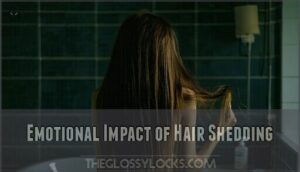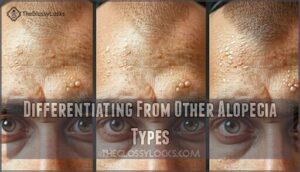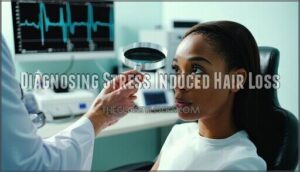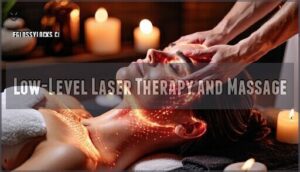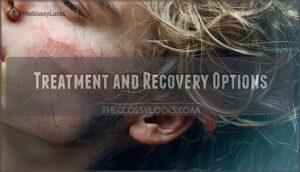This site is supported by our readers. We may earn a commission, at no cost to you, if you purchase through links.

You’ll typically notice increased shedding 2-3 months after a stressful event, but the good news is this type of hair loss is usually reversible.
Treatment combines stress management techniques like meditation and exercise with gentle hair care practices—avoiding tight hairstyles and harsh chemicals.
Nutritional support through iron, biotin, and protein helps rebuild healthy strands, and most people see regrowth within 6-12 months once stress levels stabilize and proper care begins.
Table Of Contents
- Key Takeaways
- Stress Causes Hair Loss
- Recognizing Hair Loss Symptoms
- Diagnosing Stress Induced Hair Loss
- Managing Stress Induced Shedding
- Natural Remedies for Hair Loss
- Treatment and Recovery Options
- Frequently Asked Questions (FAQs)
- Can stress cause hair loss?
- Does stress cause hair regrowth?
- How does stress affect hair growth?
- How do you treat stress-related hair loss?
- How do you fix hair loss tendencies?
- What causes stress-related hair loss?
- How can I manage stress and support my hair?
- Are all stress-related hair loss the same?
- Can stress cause thinning hair?
- Can hair grow back after stress loss?
- Conclusion
Key Takeaways
- You’ll notice increased hair shedding 2-3 months after a stressful event, but this type of hair loss (telogen effluvium) is reversible in 95% of cases when you address the underlying stress.
- You can accelerate recovery by combining stress management techniques like meditation and exercise with gentle hair care practices—avoid tight hairstyles, harsh chemicals, and use sulfate-free shampoos.
- You’ll need proper nutrition including protein, iron, biotin, and vitamin D3 to support hair regrowth, as nutritional deficiencies can worsen stress-induced shedding.
- You can expect to see new hair growth within 3-6 months of starting treatment, with complete recovery typically occurring within 6-12 months once stress levels stabilize.
Stress Causes Hair Loss
When you’re stressed, your hair follicles can shift from the growth phase into the resting phase prematurely, causing noticeable shedding within 2-3 months.
Stress sends your hair into panic mode, forcing healthy follicles into early retirement.
This condition, called telogen effluvium, affects up to 70% of your hair and results from your body’s response to physical or emotional stressors like illness, surgery, or major life changes, which can lead to a significant impact on your hair due to physical or emotional stressors.
Telogen Effluvium Overview
When stress overwhelms your system, it can trigger telogen effluvium (TE), a temporary condition where up to 70% of your hair prematurely enters the resting phase.
This stress-induced hair loss manifests as acute TE (lasting under six months) or chronic TE (persisting longer).
Unlike permanent baldness, stress-related hair loss is reversible once you address the underlying trigger.
Hair Growth Cycle Disruption
Your hair’s natural growth cycle operates like a well-orchestrated system until stress disrupts the process.
When cortisol levels spike, your hair growth cycle gets thrown off track, forcing follicles into premature shutdown.
Here’s how stress derails your hair growth cycle:
- Anagen Phase disruption cuts short the 2-7 year growth period
- Catagen Duration accelerates, rushing hair toward dormancy
- Telogen Premature entry affects up to 50% of follicles simultaneously
- Exogen Impact increases daily shedding from 100 to 300+ strands
Follicle Stem Cells become suppressed under chronic stress, delaying regrowth and extending resting periods.
This telogen effluvium creates noticeable thinning 2-3 months after your stressful event, making stress induced hair loss a delayed reaction rather than immediate hair shedding.
Common Triggers and Stressors
Life’s unexpected curveballs can trigger stress alopecia faster than you’d think.
Major events like illness and surgery create physical trauma that disrupts your hair’s natural rhythm. Emotional stress from relationship breakups or job loss hits just as hard. Even positive changes like childbirth effects can cause temporary shedding.
Notably, stress can induce shedding through conditions like telogen effluvium.
| Physical Stressors | Emotional Triggers | Lifestyle Factors |
|---|---|---|
| Illness and Surgery | Relationship breakups | Dietary Deficiencies |
| High fever episodes | Death of loved ones | Crash dieting |
| Major accidents | Job loss or changes | Environmental Factors |
| Medication changes | Financial problems | Chemical exposure |
Recognizing Hair Loss Symptoms
Recognizing the signs of stress-related hair loss helps you take action before the condition worsens.
You’ll notice increased shedding during showers, brushing, or when running your fingers through your hair, typically occurring two to three months after a stressful event.
Acute Vs Chronic Telogen Effluvium
Understanding the differences between acute and chronic telogen effluvium helps you identify what type of stress related hair loss you’re experiencing.
These Duration Differences affect your Recovery Expectations and Management Strategies substantially.
Key distinctions include:
- Acute telogen effluvium resolves within six months in 95% of cases
- Chronic telogen effluvium persists beyond six months with unclear triggers
- Severity Comparison shows chronic cases cause more extensive scalp involvement.
Trigger Identification becomes easier with acute cases, while hair loss treatment approaches differ based on chronicity.
Emotional Impact of Hair Shedding
Watching clumps of hair circle the drain can trigger immediate self-esteem issues and social anxiety about your changing appearance.
Your body image shifts as thinning becomes visible, creating a cascade of mental health challenges that compound the original stress.
Developing effective coping strategies becomes essential for protecting both your hair loss and emotional health during this vulnerable period.
Differentiating From Other Alopecia Types
While stress-related hair loss creates diffuse thinning, other conditions present distinct patterns.
You’ll need proper diagnosis for effective treatment. Key differences include:
- Androgenetic Alopecia – Creates gradual receding hairlines and crown thinning
- Alopecia Areata – Forms round, smooth bald patches suddenly
- Traction Alopecia – Causes hair loss where tension occurs
- Tinea Capitis – Shows scaly patches with broken hair shafts
- Scarring Alopecias – Leave permanent smooth areas without follicles
Subtle indicators like increased shedding can also be a sign, so it’s important to watch for early signs of hair loss.
Diagnosing Stress Induced Hair Loss
Getting an accurate diagnosis is essential when you suspect stress has triggered your hair loss.
A professional evaluation helps distinguish telogen effluvium from other conditions and guides you toward the most effective treatment approach.
Self-Assessment and Hair Loss Patterns
Daily visual checks reveal critical patterns in your hair loss journey.
Count fallen strands during washing and brushing to establish your baseline—normal shedding ranges from 100-150 hairs daily.
Document changes with photos every two weeks, focusing on your part line and crown area.
Identify triggers by reviewing stressful events from three months prior, as telogen effluvium typically manifests 90-120 days after stress occurs.
Professional Evaluation by Dermatologists
When you’re dealing with persistent hair loss, consulting a dermatologist opens doors to expert evaluation and targeted solutions.
These hair loss experts use dermatologist expertise to provide accurate diagnosis through thorough scalp examination and medical history review.
Your dermatologist will discuss personalized treatment options based on your specific condition, ensuring you receive appropriate care.
Professional evaluation distinguishes stress-related hair loss from other conditions, leading to effective treatment plans and essential follow-up care.
Trichoscopy and Scalp Examination
Several diagnostic techniques help hair loss experts examine your scalp with remarkable precision.
Trichoscopy findings reveal empty follicles and miniaturized hairs characteristic of stress-induced shedding. This non-invasive examination technique uses magnification to assess follicle health without requiring a scalp biopsy.
Your dermatologist can achieve excellent diagnostic accuracy by identifying specific patterns that distinguish telogen effluvium from other conditions affecting scalp health, which is crucial for determining the best course of treatment based on scalp health.
Blood Tests for Underlying Conditions
Your doctor might recommend blood tests to rule out underlying conditions that mimic stress-related hair loss.
These tests examine hormone levels, thyroid function, and nutrient deficiencies that could trigger shedding.
Key tests include:
- Thyroid function panels – detecting hypothyroidism that slows hair growth
- Iron and ferritin levels – identifying deficiencies causing widespread thinning
- Autoimmune screening – ruling out conditions like lupus affecting follicles
Inflammation markers help distinguish between stress-induced telogen effluvium and other hair loss diagnosis requiring different treatment options.
Managing Stress Induced Shedding
When your hair starts falling out from stress, you’ll need to switch to gentler care practices that protect what’s left while encouraging new growth.
The right combination of stress management, proper nutrition, and scalp stimulation can help restore your hair’s natural growth cycle within three to six months, which can be achieved through proper nutrition.
Gentle Hair Care Practices
Once you’ve identified stress-induced hair loss, treating your strands like fragile silk becomes your priority.
You’ll want sulfate-free shampoos and soft bristle brushes to minimize breakage.
Heat protectants shield from styling damage, while silk pillowcases reduce friction overnight.
Many people choose to buy shampoo without sulfates for this reason.
Minimal styling helps stressed follicles recover naturally, supporting your stress relief hair journey effectively.
Scalp Massage and Stimulation Techniques
Massage benefits extend beyond relaxation when you’re dealing with hair loss stress. Regular scalp stimulation methods increase blood flow, enhance product absorption, and activate dormant follicles.
You can perform effective DIY techniques using your fingertips or specialized massage tools. Many people find scalp massage devices helpful in this process.
- Circular motions – Apply gentle pressure using fingertips for 5-10 minutes daily
- Essential oils – Mix rosemary or peppermint oil with carrier oils for enhanced stimulation
- Massage tools – Use scalp massagers or brushes to improve circulation consistently
- Timing strategy – Perform before washing to maximize stress reduction hair loss benefits
Stress Reduction Strategies
While scalp massage improves circulation, addressing the root cause requires thorough stress management.
Mindfulness practices like meditation reduce cortisol levels that trigger hair loss stress.
Regular exercise benefits include improved blood flow and natural stress relief.
Sleep hygiene supports healthy hair cycles, while social support provides emotional stability.
Effective time management prevents overwhelming situations that worsen stress reduction hair loss patterns.
Nutritional Support for Hair Health
Fueling your follicles with proper nutrition combats hair loss due to stress effectively.
Your body needs vitamins like D3, minerals including iron for ferritin levels, and adequate protein for keratin production.
Nutritional deficiency accelerates shedding, while antioxidants protect against oxidative damage.
Prioritize hydration and address vitamin D3 or ferritin deficiency through targeted supplementation when hair loss and nutrition concerns intersect.
Natural Remedies for Hair Loss
While managing stress-induced hair loss, natural remedies can complement your recovery plan and support healthy regrowth.
These gentle approaches work alongside stress reduction techniques to nourish your hair follicles and restore your hair’s natural growth cycle, which can help with healthy regrowth.
Dietary Changes and Supplements
Beyond managing stress through gentle care practices, your body needs proper fuel to rebuild damaged hair follicles.
Iron deficiency and low vitamin D3 levels can worsen hair loss due to stress. Focus on protein intake from lean meats and legumes, while omega-3 benefits include reduced inflammation.
Supplements targeting ferritin deficiency and vitamins for hair growth support recovery when combined with adequate hydration importance. You can find effective iron supplements to combat deficiencies.
Herbal Remedies and Aromatherapy
Natural plant-based powerhouses offer gentle yet effective solutions for stress-related hair loss.
Herbal DHT Blockers like saw palmetto target hormone imbalances, while Essential Oil Blends containing rosemary and peppermint improve scalp circulation through topical applications.
Consistent scalp massage can provide increased blood flow to the scalp.
- Ayurvedic Herbs such as ginseng enhance follicle health and combat oxidative stress
- Aromatherapy Diffusers create calming environments that support stress management techniques
- Topical Herbal Treatments deliver concentrated nutrients directly to affected areas
Low-Level Laser Therapy and Massage
Low-level laser therapy (LLLT) uses red light to stimulate cellular activity in hair follicles, promoting regrowth through improved blood circulation.
Research shows LLLT mechanisms enhance ATP production in follicular cells.
Combined therapy efficacy increases when you pair laser treatments with scalp massage frequency of 10-15 minutes daily. Various massage technique variety options target stress-related hair loss effectively.
Treatment and Recovery Options
When stress triggers hair loss, you’ll need targeted treatments to restore healthy growth and regain confidence in your appearance.
The good news is that multiple proven options exist, from medical interventions to lifestyle adjustments that can accelerate your hair’s natural recovery process.
Medications and Therapies for Hair Loss
When medications become necessary, you’ve got several proven options for stress and hair loss treatment.
Minoxidil treatment stimulates follicles directly, while finasteride use blocks DHT when androgenetic alopecia coexists with stress.
Corticosteroids target inflammatory hair loss, and light therapy enhances cellular activity.
For severe cases, hair transplants provide permanent solutions with 85% satisfaction rates.
Lifestyle Changes for Hair Regrowth
Simple lifestyle adjustments accelerate hair regrowth after stress-induced loss.
Dietary improvements rich in protein, iron, and vitamins nourish follicles from within.
Sleep optimization supports cellular repair, while exercise benefits circulation to your scalp.
Hydration importance can’t be overstated—drink plenty of water daily.
Maintain scalp health through gentle cleansing and avoid harsh chemicals during recovery to support hair regrowth and overall scalp health.
Coping Mechanisms for Emotional Stress
Managing hair loss and emotional stress requires building strong support systems and practicing mindfulness techniques.
You’ll find cognitive reframing helps shift negative thoughts about your appearance, while emotional regulation strategies keep anxiety manageable.
Creative outlets like journaling or art provide healthy stress relief.
These coping strategies directly support your hair regrowth journey by reducing cortisol levels that trigger stress-related hair loss, utilizing cognitive reframing and emotional regulation.
Long-Term Hair Care and Maintenance
Successfully establishing lifelong hair health requires dedication to proven maintenance strategies that protect your scalp and promote consistent growth.
Your long-term success depends on implementing these core practices:
- Scalp Health: Maintain clean, balanced scalp conditions through gentle cleansing
- Gentle Styling: Avoid tight hairstyles and excessive heat damage
- Hydration Importance: Drink adequate water for ideal follicle function
- Routine Consistency: Follow regular hair care schedules for sustained results
To further enhance hair health, consider how environmental factors affect growth.
Frequently Asked Questions (FAQs)
Can stress cause hair loss?
Yes, stress can cause hair loss through telogen effluvium. When you’re stressed, your hair follicles enter a resting phase prematurely, leading to noticeable shedding two to three months later.
Does stress cause hair regrowth?
Like a phoenix rising from ashes, your hair can indeed regrow after stress-induced telogen effluvium.
Once you’ve managed your stress levels and eliminated triggering factors, your hair follicles will typically return to their normal growth cycle within six months, allowing for a full regrow.
How does stress affect hair growth?
Stress disrupts your hair’s natural growth cycle by pushing follicles into a resting phase prematurely.
Elevated cortisol levels reduce blood flow to your scalp, limiting nutrients and causing increased shedding within three months, which can be a significant factor in hair loss.
How do you treat stress-related hair loss?
Manage stress through meditation, exercise, or therapy to address the root cause. Eat protein-rich foods, take biotin supplements, and maintain gentle hair care routines while waiting for natural regrowth.
How do you fix hair loss tendencies?
Sarah noticed handfuls of hair falling out after her divorce three months earlier.
You can fix hair loss tendencies by managing stress through meditation, eating protein-rich foods, ensuring adequate sleep, and maintaining gentle hair care routines with scalp massages, which can also help reduce overall stress.
What causes stress-related hair loss?
When you’re stressed, your body produces elevated cortisol levels that push hair follicles into their resting phase prematurely, causing excessive shedding two to three months later.
How can I manage stress and support my hair?
Picture your hair follicles like tiny gardens weathering a storm.
You can nurture recovery by practicing daily meditation, eating protein-rich foods, getting quality sleep, and gently massaging your scalp to boost circulation.
This approach helps to boost circulation and overall hair health.
Are all stress-related hair loss the same?
No, you’ll encounter different types of stress-related hair loss. Telogen effluvium causes diffuse thinning, while alopecia areata creates patchy bald spots, and trichotillomania involves compulsive hair pulling behaviors.
Can stress cause thinning hair?
Up to 50% of your scalp hairs can shift into the resting phase during major stress, causing noticeable thinning within two to three months as follicles prematurely stop growing.
Can hair grow back after stress loss?
Yes, hair typically grows back after stress-related loss. Telogen effluvium is temporary, with 95% of acute cases resolving within six months once you’ve addressed the underlying stressor and maintained healthy habits.
Conclusion
Studies show that 90% of people experiencing stress-related hair loss can expect complete recovery within 12 months.
Hair loss due to stress treatment requires patience and consistency, but your follicles aren’t permanently damaged.
You’ll see the best results when you combine stress management techniques with proper nutrition and gentle hair care practices.
Remember that hair regrowth takes time—typically 3-6 months before new growth becomes visible, and with commitment to your treatment plan, you’ll likely regain your hair’s fullness and strength.


